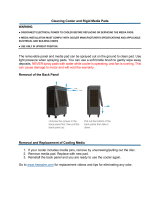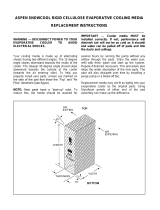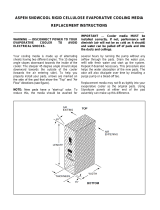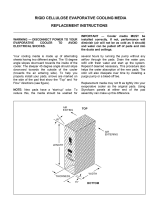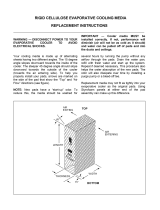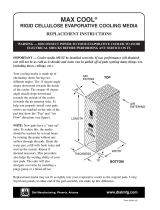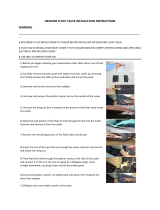
110498-2
20
No.
N° Description / Descripción ASA51 ASA5112 ASA71 ASA7112
1. Top, Cabinet / Tapa De La Caja .....................................................................................222130-070 222130-070 222140-053 222140-053
2. Top Access Panel / Panel Superior De Acceso ............................................................... 222130-074 222130-075 222130-074 222130-075
3. Bottom, Blower Section / Base De La Sección De La Rueda ......................................... 322130-069 322130-069 322140-052 322140-052
4. Bottom, Wet Module / Base De La Sección De Agua .....................................................222130-072 222130-073 222130-072 222130-073
5. Front Panel / Panel Del Frente ........................................................................................ 322130-077 322130-077 322140-056 322140-056
6. Inspection Panel (2 req.) / Panel De Inspección (2 req.) ................................................224130-002 224130-002 224140-002 224140-002
7. Center Post, Right / Poste Central, Derecho ..................................................................222130-062 222130-062 222140-045 222140-045
8. Center Post, Left / Poste Central, Izquierdo .................................................................... 222130-063 222130-063 222140-046 222140-046
9. Back Post, Right / Poste Trasero, Derecho ..................................................................... 222130-064 222130-066 222140-047 222140-049
10. Back Post, Left / Poste Trasero, Izquierdo ......................................................................222130-065 222130-067 222140-048 222140-050
11. Blower Housing / Caja De La Rueda ..............................................................................324130-203 324130-203 324140-203 324140-203
12. Cut-Off Plate / Placa Externa ..........................................................................................224003-015 224003-015 224004-003 224004-003
13a. Blower Housing Support, Right / Soporte Para La Caja De La Rueda, Derecho ............ 218001-035 218001-035 218001-038 218001-038
13b. Blower Housing Support, Left / Soporte Para La Caja De La Rueda, Izquierdo ............. 218001-036 218001-036 218001-038 218001-038
14. Grill / Parrilla ....................................................................................................................222130-078 222130-078 222140-057 222140-057
15. Electrical Junction Box / Caja De Empalme .................................................................... 322009-001 322009-001 322009-001 322009-001
16. Motor Mount / Montura Del Motor ................................................................................... 314003-011 314003-011 314003-012 314003-012
17. Motor Mount Clip Set / Conjunto De Seguros Para Montar Motor ..................................314005-001 314005-001 314005-001 314005-001
18. Motor / Motor ...................................................................................................................* * * *
19. Pulley, Motor / Polea Del Motor .......................................................................................* * * *
20. Electrical Cord, Motor (115V) / Cable Eléctrico Del Motor (115V) ...................................110372 110372 110372 110372
20. Electrical Cord, Motor (230V) / Cable Eléctrico Del Motor (230V) ..................................§110372-2 §110372-2 §110372-2 §110372-2
21. Shaft, Blower Wheel / Eje De La Rueda .........................................................................110183 110183 110183 110183
22. Blower Wheel / Rueda ....................................................................................................16BW 16BW 20BW 20BW
23. Pulley, Blower Wheel / Polea De La Rueda ....................................................................110275 110275 110276 110276
24. Drive Belt / Correa ...........................................................................................................* * * *
25. Bearings, Blower Wheel Shaft / Cojinetes Del Eje De La Rueda ....................................110351 110351 110351 110351
26. Receptacle, Motor / Toma De Corriente Del Motor .........................................................110393 110393 110393 110393
27. Receptacle, Pump / Toma De Corriente De La Bomba ................................................... 110361 110361 110361 110361
28. Media Shield, Right / Protector Para El Medio Evaporativo, Direcho .............................281043-002 281045-002 281044-002 281046-002
29. Media Shield, Left / Protector Para El Medio Evaporativo, Izquierdo .............................281043-001 281045-001 281044-001 281046-001
30. Water Distributor Housing / Caja Del Distribuidor De Agua ............................................281038-001 281033-001 281038-001 281033-001
31. Water Distributor Tube / Tubo Del Distribuidor De Agua .................................................3D-23 3D-23 3D-23 3D-23
32. Evaporative Media Set / Conjunto De Medio Evaporativo ..............................................310117-001 310118-001 310117-002 310118-002
33. Distributor Filter Pad / Filtro Del Distribuidor ................................................................... 110120 110120 110120 110120
34. Water Reservoir / Bandeja Acumuladora De Agua .........................................................281041-001 281042-001 281041-001 281042-001
35. Tube, Water Delivery / Tubo De Agua ............................................................................. 310716 310716 310716 310716
36. Over Flow Assembly / Montaje De Desagüe ...................................................................110610 110610 110610 110610
37. Float Valve / Flotador ......................................................................................................FL-C FL-C FL-C FL-C
38. Float Shield / Salpicadero Del Flotador ...........................................................................281006 281006 281006 281006
39. Pump / Bomba ................................................................................................................110429 110429 110429 110429
41. Pump Mount / Montura De La Bomba .............................................................................218002-012 218002-012 218002-012 218002-012
42. Pump Retainer / Sujetador De La Bomba .......................................................................110714 110714 110714 110714
43. Anti-Flattening Coil / Espiral Protectora ..........................................................................110847 110847 110847 110847
44. Bleed-Off Kit / Equipo De Purga......................................................................................310586 310586 310586 310586
* See the motor specifi cation table. Motor sold separately. / Vea la tabla de especifi caciones del motor. Motores se vende por separado.
§ 230V motor cord is optional and not supplied with cooler. / Cable eléctrico del motor de 230V es opcional y no se envía con el enfridor.
NOTE: Standard hardware items may be purchased from your local hardware store.
NOTA: Artículos de uso corriente pueden comprarse en la ferretería de su localidad.
PARTS LIST: SIDE DISCHARGE CONFIGURATION /
LISTA DE PIEZAS: CONFIGURACIÓN DE DESCARGA LATERAL





















